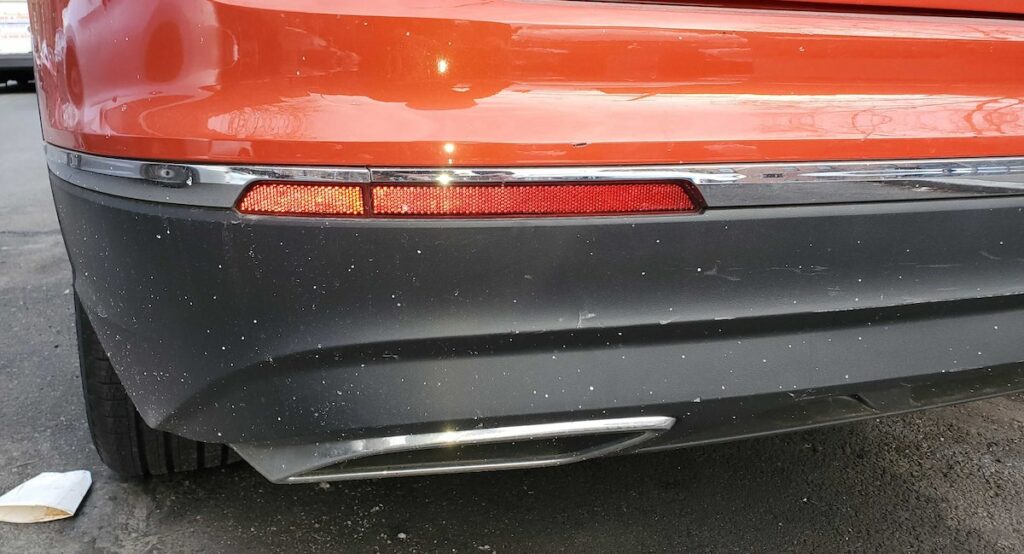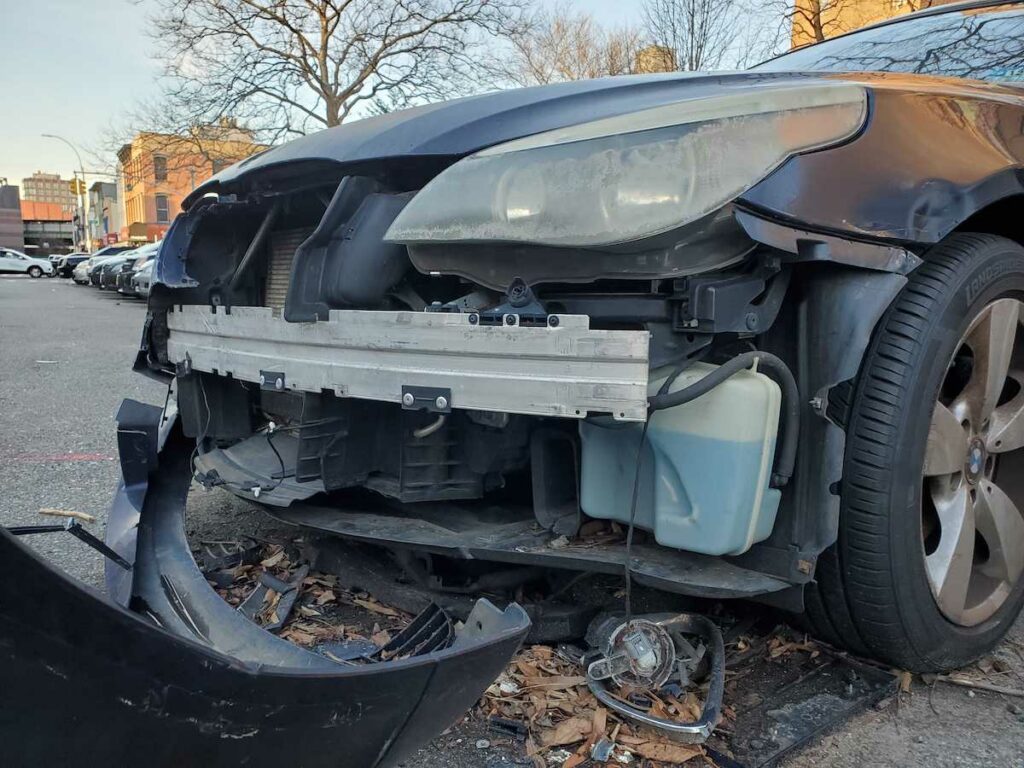Bumper Repair, Explained
Someone bumped your bumper? Here's what you need to know.

Someone bumped your bumper? Here's what you need to know.

Front and rear bumpers are more practical than sexy—no one ever bought a car simply because of how its front bumper looked.
But that bumper becomes pretty important if you’re in an accident. Bumpers absorb impact and protect the rest of your car from serious damage, saving you on repair costs and protecting you and your passengers.
You may not buy your car because of its bumper, but you’ll be glad it’s there after a collision. Since you’ll want to get it fixed ASAP, here’s what you need to know about bumper repairs—and how much it’s going to cost you.
Because of their importance in absorbing damage, it’s pretty common for bumpers to get damaged in minor collisions.

Depending on the extent of the damage, you could be looking at a minor repair or a bumper replacement. Anytime you’re in a fender bender, you should take your car to an auto body shop to have it checked out.
Why? Even if there’s no visible bumper damage, behind it are other components that could have been hurt, such as:
An auto body shop will tell you if you need a bumper repair or placement.
Minor scratches, small dents, and dings are easy to fix. Auto body repair shops can usually use plastic filler on scratches, dents, and dings, then repaint and blend over any bumper repair. Some auto body shops offer paintless dent repair, which is cheaper because it has lower labor costs.
If the accident caused severe damage, like deep cracks or holes, or if the bumper is falling off, you probably need a new one.

Don’t assume it’s not fixable without getting an expert opinion. If you’ve got Lemonade Car as your car insurance company we’ll let you know about auto body repair shops in our network who can evaluate the damage. If you already have a shop you like working with, that’s okay too.
The cost of a bumper repair depends on the type of vehicle you drive, the extent of the damage, your deductible, and the average cost of repair shops in your area.
A plastic bumper with an aluminum or steel reinforcement bar costs less to repair than older steel bumpers. And if you have a bumper cover, you might only have to replace it.
There are four types of repairs to fix a damaged bumper, depending on the type of damage:
Traditional dent repair starts by sanding the bumper’s paint off, then banging the metal back into place. Then the technician sands, fills, and paints the dent to remove and cover it up.
This method uses special tools to pull out dents without causing paint damage. It’s cheaper and quicker than traditional dent repair, but won’t work on plastic bumpers that need more than simple buffing. And if the accident caused paint damage or ruined the bumper’s surface, it’s not an option.
Repair shops fix cracks and punctures by sanding down the area and patching them with adhesives. The average cost is between $325 and $425, depending on if you need to repaint the area.
If you were in a low-speed collision, you might have driven away with just some minor scratches or scrapes. These are a quick fix, unlike deep scratches with severe paint chips that reveal the metal or plastic of the bumper. Scratch repairs cost anywhere from $50 to $600. For minor scratches you can consider just buying a DIY repair kit.
The cost of a bumper replacement depends on the car’s make, model, and year. An original equipment manufacturer (OEM) bumper is typically more expensive to replace than an aftermarket bumper.
A new bumper for a passenger car costs anywhere between $100 and $1,000, with an additional $200 to $600 for installation and a new paint job. Bumpers for luxury vehicles, trucks, and SUVs will cost more.
Labor rates vary widely at auto body repair shops and dealerships nationwide.
According to AAA, labor rates at auto body repair shops range between $50 to $220 an hour. You could drive a truck through that range! Repair shops base their labor rates on the following:
Look, we understand, no one wants their insurance premiums to go up. If you report an accident to your insurance company, your rates may go up.
That’s why some drivers choose to pay for a minor collision repair out of pocket. But should you? First, ask yourself these questions.
Let’s say you have a $1,000 deductible. If your minor bumper repair costs are only $350, that’s lower than your deductible—so it won’t be covered anyway, and won’t be worth it to file an insurance claim.
A lot of times a collision with another vehicle results in a more expensive bumper repair or replacement. If the accident was your fault, check your deductible and coverage with your insurance company.
Collision coverage pays for damage to your vehicle and the other driver’s vehicle. If you don’t have collision coverage, you are responsible for paying for all repairs.
If you were not at fault, take down information about the other driver’s insurance company and file an insurance claim with them. When you take your car to an auto body shop for repairs, they’ll coordinate payment.
Sometimes the other driver offers to pay for your repairs out of their own pocket, rather than filing a claim with their insurance. In that case, you’re taking an unnecessary risk given that your rates won’t rise if they’re at fault. Remember, if you decide not to file an insurance claim, you won’t have your insurance company backing you up if the other driver later disputes who’s at fault.
Your best bet with a bumper repair is to file an insurance claim and handle it all above bumper— er, board. If you need to file a claim, Lemonade makes it easy!
Don’t have Lemonade Car yet? Get your fast and easy quote by clicking the button below.
A few quick words, because we <3 our lawyers: This post is general in nature, and any statement in it doesn’t alter the terms, conditions, exclusions, or limitations of policies issued by Lemonade, which differ according to your state of residence. You’re encouraged to discuss your specific circumstances with your own professional advisors. The purpose of this post is merely to provide you with info and insights you can use to make such discussions more productive! Naturally, all comments by, or references to, third parties represent their own views, and Lemonade assumes no responsibility for them. Coverage and discounts may not be available in all states.
Please note: Lemonade articles and other editorial content are meant for educational purposes only, and should not be relied upon instead of professional legal, insurance or financial advice. The content of these educational articles does not alter the terms, conditions, exclusions, or limitations of policies issued by Lemonade, which differ according to your state of residence. While we regularly review previously published content to ensure it is accurate and up-to-date, there may be instances in which legal conditions or policy details have changed since publication. Any hypothetical examples used in Lemonade editorial content are purely expositional. Hypothetical examples do not alter or bind Lemonade to any application of your insurance policy to the particular facts and circumstances of any actual claim.